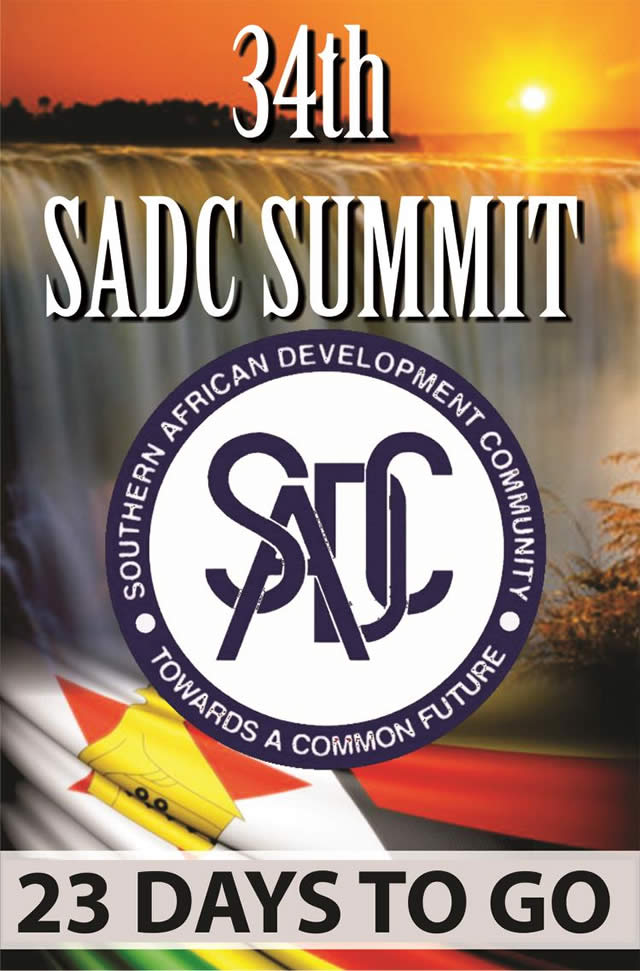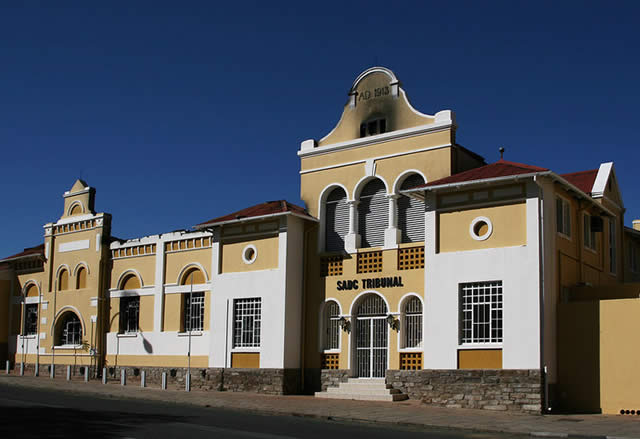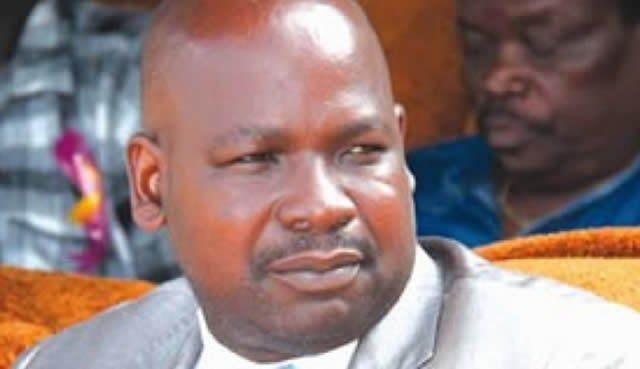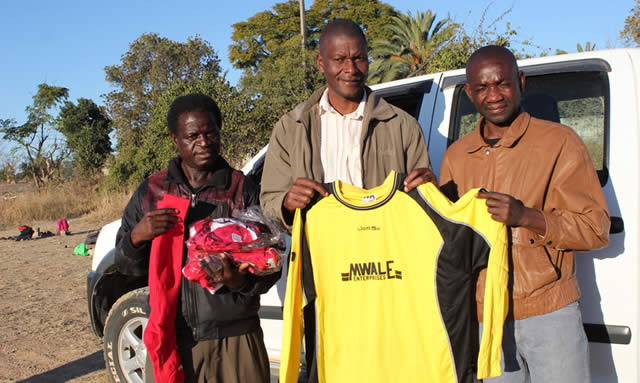Towards a new Sadc Tribunal

This picture combo shows (from above), Windhoek’s historic Turnhalle Building, seat of the SADC Tribunal; Attorney-General Johannes Tomana; and Minister of Foreign Affairs Dr Simbarashe Mumbengegwi
Lovemore Chikova News Editor
The 34th Summit of Sadc heads of state and government in Victoria Falls next month presents the region with an opportunity to exorcise the ghost of the Sadc Tribunal and come up with a new structure that is acceptable to member states. The major bone of contention which led to the dissolution of the Tribunal at the regional leaders’ meeting at the 32nd Sadc Summit in Mozambique in 2012 was that it was straying from its mandate.
Many of the Sadc members were not amenable to a regional body which would eventually usurp their sovereignty and interfere with their internal processes.
There are high expectations that the Victoria Falls summit will lay the ground for a tribunal that is acceptable to all member states for progress to be realised.
Zimbabwe’s Foreign Affairs Minister, Simbarashe Mumbengegwi, has since indicated that the Heads of State and Government will receive a report on progress in the formulation of a new protocol on the Sadc Tribunal when they meet for the summit in Victoria Falls.
Briefing the media on preparations for the summit, Minister Mumbengegwi said the leaders will discuss constituting a reformed Sadc Tribunal.
“As you know, the previous Sadc Tribunal got into difficulties on account of the manner in which it had been brought into force and now we are coming up with a new protocol which will be considered at the next summit,” he said.
After the dissolution of the Sadc Tribunal, ministers of justice and attorneys-general were directed to negotiate a new protocol to reconstitute the Tribunal and give it a fresh mandate.
It is this fresh mandate which will define the relations between the Tribunal and member states, some of whom are still apprehensive after being affected by the Tribunal’s warped judgments.
The jurisdiction of the Tribunal should in the end be confined only to any disputes arising between member countries, with respect to the interpretation of the Sadc Treaty and any Sadc protocols.
The Tribunal should play only an advisory role in the interpretation of the Sadc Treaty and any other protocols that may be negotiated between member states.
And this is the fresh mandate that the Tribunal is expected to take after the deliberations in Victoria Falls.
Only five countries out of the expected 10 ratified the treaty establishing the Tribunal, indicating how member states were not keen on the body.
What is important about the discussions on the Tribunal is that they are going to take place in Zimbabwe which was at the forefront of alerting the region to the complications that the Tribunal created.
In fact, Zimbabwe was used as a test case for the Tribunal and it was clear from what transpired and the way the situation was handled that the Tribunal’s operations was riddled with loopholes.
The Tribunal courted controversy when it nullified the land reform programme and handed down judgments that were in conflict with Zimbabwe’s constitutional position on the programme.
Some 79 white former commercial farmers led by the late Mr Mike Campbell, took their cases to the Tribunal, which was based in Windhoek, Namibia, in a bid to reverse the agrarian reforms after the State acquired farms for redistribution to landless majority.
Zimbabwe was outraged by the judgments which were tantamount to interfering with its internal affairs and overturning its processes.
Battle lines were then drawn as the country convinced all other members that the direction being taken by the Tribunal was wrong, since states could not be expected to cede their rights to sovereignty to a body they had created.
The dissolution of the Tribunal also followed arguments by Zimbabwe that the body was improperly constituted as the requisite number of countries had not ratified the treaty establishing it.
Zimbabwe’s High Court refused to register the order by the Tribunal last year and the former farmers then approached the South African courts.
Pretoria High Court judge Roger Claasen ruled and granted an order that the former commercial farmers could attach Zimbabwe’s property in Cape Town because it was not covered by diplomatic immunity as it was being used for commercial purposes.
Attorney-General (now Prosecutor-General) Mr Johannes Tomana said the South African court erred since it attempted to bind the country to the decision of the Tribunal that had been disbanded.
The South African court’s judgment did not, in the end, have any effect.
The 2012 Sadc Summit resolved to bar individuals and companies from bringing cases before the Tribunal, but until that, only individuals had approached it.
Sadc member states normally do not take each other to court, so it remains to be seen how the Tribunal will operate in its new form expected to be discussed in Victoria Falls.
Housed at the Turnhalle Building in Windhoek, the capital of Namibia, the Sadc Tribunal is a court and the highest policy institution of the regional bloc.
It was established in 1992, but its members were only appointed during the Sadc Summit in 2005 and it was inaugurated on November 18 the same year.
What went wrong with the Tribunal was that it wanted member states to abrogate their sovereignty to a body they had established, a situation that is not tenable anywhere in the world.
Most of the Sadc member states would not want to dilute their sovereignty.
The demise of the Tribunal had some valuable lessons for the region: that member states are keen to protect their sovereignty and independence and bodies they create cannot replace that aspect.
According to the Sadc Tribunal website, its establishment was meant to ensure that every country within the bloc respected and conformed to the principles and objectives enshrined in the Sadc Treaty of 1992.
To ensure the independence of the Tribunal, Article 17 (2) of the Sadc Treaty provides that in performance of their duties, members of the Tribunal shall be committed to the international character of Sadc and shall not seek or receive instructions from any member states, or from any authority external to Sadc.
It mandate included ensuring adherence to and proper interpretation of the Sadc Treaty and its subsidiary instruments and to adjudicate upon such disputes as may be referred to it.
It was also meant to give advisory opinions on such matters as the Sadc Summit or the Sadc Council may refer to it.
Its vision is to be a world-class international court in an integrated Sadc region that promotes and protects human rights, democracy and the rule of law.
What is needed as the Sadc leaders tackle the proposed protocol on the Tribunal in Victoria Falls is to ensure that they will not create another institution that will be viewed as a monster by the member states.
The mandate of the Tribunal should be made clear to avoid situations where it will interfere with the sovereignty of the members.












Comments